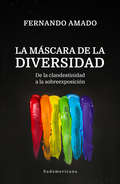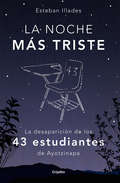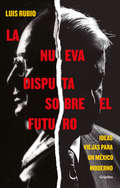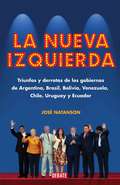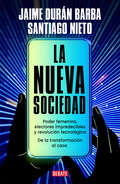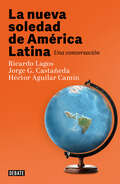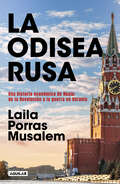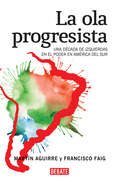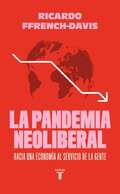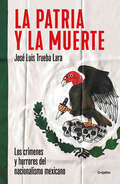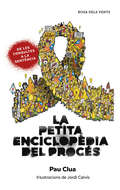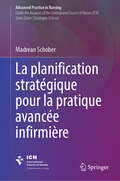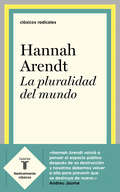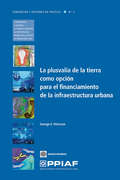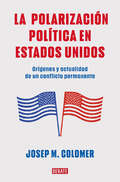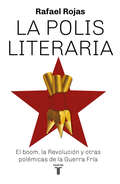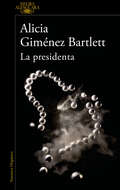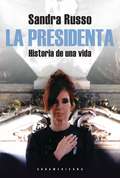- Table View
- List View
La máscara de la diversidad: De la clandestinidad a la sobreexposición
by Fernando AmadoA partir de la investigación y de decenas de entrevistas -a referentes de la cultura, la política y demás ámbitos de la escena pública que comparten su verdad-, Fernando Amado construye un libro necesario, que no dejará indiferente a nadie. Hasta hace poco tiempo, un segmento importante de la población uruguaya ocultaba su verdadero yo. Hoy eso está cambiando; gais, lesbianas, trans y demás representantes de otras formas de orientación sexual e identidad de género se expresan, interpelan y están modificando el paisaje urbano. Este libro explora cómo se da ese destape de la comunidad LGBT en Uruguay, hasta qué punto es genuino, la operación política que hay detrás, la presión cuerpo a cuerpo para concretar el paquete legislativo de agenda de derechos, qué subyace bajo esa alfombra que ahora comienza a verse y cuánto permanece en la sombra. El Uruguay gay friendly, el discurso políticamente correcto, el lobby y sus operadores, la agenda de la diversidad, el poder rosa, la identificación y las costumbres, los famosos que lideran el destape, la hermandad de “las cortes”, las zonas más hostiles, los “tapados” y la persistente cuota de hipocresía son los elementos centrales de un mapa que aún no se ha revelado en su totalidad.
La nació en portada: El debat de Catalunya i Espanya a la premsa
by Antoni BassasÉs Catalunya una nació? És Espanya plurinacional? Una invitació al debat des d'un periodisme rigorós. El 12 de setembre de 2019, el periodista Antoni Bassas va pronunciar una conferència al Círculo de Bellas Artes de Madrid amb motiu de la festa nacional de Catalunya, que va acabar amb una llarguíssima ovació dels presents i milers de reproduccions posteriors a YouTube. Bassas, una de les veus amb més credibilitat i influència en el panorama informatiu contemporani, hi va presentar una selecció de portades de la premsa de Barcelona i de Madrid dels darrers 40 anys, en un exercici de periodisme comparat que permetia percebre el canvi de tonalitats de la vida social i política a Catalunya i Espanya i que van de l'afirmació nacional catalana a través de l'Estatut d'Autonomia fins al col·lapse de la via estatutària que dona pas a la reclamació del dret a l'autodeterminació, el referèndum de l'1 d'octubre de 2017 i la condemna per sedició dels seus responsables polítics en sentència del Tribunal Suprem el 2019. Ja fa més de quaranta anys que es va aprovar la Constitució i la reivindicació nacional de Catalunya ha acabat per condicionar decisivament l'actuació de tots els actors de la vida institucional espanyola. I Bassas es pregunta: «Si, com repeteixen els mitjans espanyols, el Procés constitueix el desafiament més gran de la història recent d'Espanya i si Catalunya pot posar Espanya de panxa enlaire, no deu ser que no estem davant d'una comunitat autònoma més? I que la recepta no pot ser policies i jutges, sinó la negociació política i el referèndum pactat, com a Escòcia o al Quebec?».
La nación en portada: El debate de Cataluña y España en la prensa
by Antoni Bassas¿Es Cataluña una nación? ¿Es España plurinacional? Una invitación al debate desde un periodismo riguroso. El 12 de septiembre de 2019, el periodista Antoni Bassas pronunció una conferencia en el Círculo de Bellas Artes de Madrid con motivo de la fiesta nacional de Cataluña, que terminó con una larguísima ovación de los presentes y miles de reproducciones posteriores en YouTube. Bassas, una de las voces con más credibilidad e influencia en el panorama informativo contemporáneo, presentó una selección de portadas de la prensa de Barcelona y Madrid de los últimos 40 años, en un ejercicio de periodismo comparado que permitía percibir el cambio de tonalidades de la vida social y política en Cataluña y España y que van de la afirmación nacional catalana a través del Estatuto de Autonomía hasta el colapso de la vía estatutaria que da paso a la reclamación del derecho a la autodeterminación, el referéndum del 1 de octubre de 2017 y la condena por sedición de sus responsables políticos en sentencia del Tribunal Supremo en el año 2019. Hace ya más de cuarenta años que se aprobó la Constitución y la reivindicación nacional de Cataluña ha terminado por condicionar decisivamente la actuación de todos los actores de la vida institucional española. Y Bassas se pregunta: «Si, como repiten los medios españoles, el Procés constituye el desafío más grande de la historia reciente de España y si Cataluña puede poner España boca arriba, ¿no será que no estamos ante una comunidad autónoma más? ¿Y que la receta no puede ser policías y jueces, sino la negociación política y el referéndum pactado, como en Escocia o Quebec?».
La noble igualdad
by Ignacio MazzoccoLa Constitución Nacional Argentina explicada al pueblo. O de cómo unlibro que parece lejano puede volverse un manual de instrucciones parala vida actual. La mayoría de los habitantes de la República sufre cotidianamente algunode estos dos problemas:+ No conocen sus derechos y por ende no logran hacerlos respetarporque ni siquiera saben que existen.+ Conocen sus derechos pero no logran hacerlos valer.Por eso mismo, «La Noble Igualdad» "traduce" el sistema legal argentino(hasta hoy oscuro, encriptado y accesible para pocos) y explica conlenguaje de barrio los derechos que la Constitución Nacional nos da atodos los habitantes de la Argentina. Está escrito para ser comprendidotanto por un joven de doce años como por sus abuelos, por una personaque apenas sabe leer, un ingeniero en astrofísica, una maestra y, claro,un abogado (al que buena falta puede hacerle bajar al nivel de lacalle).Las leyes y la Justicia afectan cada momento de nuestra vida cotidiana;deciden qué podemos hacer y qué no, qué podemos poseer y qué no, quépodemos decir y qué no y qué cosas es posible exigir tanto al Estadocomo al resto de nuestros conciudadanos.Pero por lo general, los abogados, jueces y académicos del Derecho«hablan y escriben raro». Todos debemos entender claramente cómofunciona el sistema legal, qué herramientas nos da la ConstituciónNacional, cuáles son nuestros derechos y cómo hacerlos respetar.No entender un derecho es como no tenerlo.www.lanobleigualdad.org
La noche más triste: La desaparición de los 43 estudiantes de Ayotzinapa
by Esteban IlladesUn libro que analiza los pormenores de la investigación sobre la desaparición de los 43 normalistas de Ayotzinapa, y la somete a un examen crítico.Desde una perspectiva que va a contracorriente de la politización con la que se ha abordado el caso, Esteban Illades analiza minuciosa y objetivamente el escenario social en el que ocurrieron las desapariciones de los estudiantes de la Escuela Normal Rural Raúl Isidro Burgos de Ayotzinapa, una de las tragedias humanitarias que ha representado un punto de inflexión en la historia mexicana contemporánea.Ya han pasado varios meses desde que desparecieron a los 43 normalistas. A la fecha se han encontrado 19 fosas en las afueras de la ciudad de Iguala, y por lo menos 28 cuerpos. Después de las primeras investigaciones, tanto gobierno estatal como federal han dicho que los restos encontrados no pertenecen a los normalistas, pero tampoco se ha dicho de quién son. Un grupo independiente de peritos argentinos también ha realizado estudios que contradicen la verdad oficial que ha pregonado la Procuraduría General de la República.El padre Alejandro Solalinde ha declarado que testigos y sobrevivientes le han contado que los 43 "fueron calcinados en una pira de madera". A la fecha -subraya el autor-, hay más detenidos que desaparecidos: 36 policías y varios supuestos miembros del cártel de los Guerreros Unidos, pero ¿qué pasó realmente?¿Dispararon los policías contra los estudiantes? ¿Los entregaron después al cártel? ¿Subieron a alguna de las múltiples fosas que se han encontrado? Hasta quién dio la orden: ¿Fue el presidente municipal? ¿Fue su esposa? ¿Fue uno de los líderes de los Guerreros Unidos?Poco se sabe al día de hoy. Pero si revisamos lo ocurrido en Iguala durante 2012 y 2013, podemos encontrar información que ayuda a explicar, en parte, la desaparición de 43 estudiantes, la muerte de otros seis y cómo ocurrió con total y absoluta impunidad. He aquí el primer libro que intenta responder las incómodas interrogantes desde una visión clara e imparcial.www.megustaleer.com.mx
La noia d'Aberdeen
by Quim ArandaA La noia d’Aberdeen, Quim Aranda s’endinsa en l’actualitat més roent del país per oferir-nos una gran novel·la negra de tall clàssic. I, de rerefons, una pregunta inquietant: quins esdeveniments no previstos poden fer avançar, o bé descarrilar, el procés en què ens trobem immersos? Dilluns, 26 d’agost de 2013. A pocs dies de la Diada, troben al seu pis de Barcelona el cos sense vida del professor escocès Paul McEwan, assessor del Govern català en el procés cap a la independència. Vidu d’una certa edat, respectat per la comunitat acadèmica, McEwan havia d’explorar les vies jurídiques que garantissin que una Catalunya independent continués dins la Unió Europea. En el caliu previ a la celebració de la Via Catalana, comença a prendre cos la teoria d’un assassinat polític per part dels cossos paral·lels de l’Estat. Enmig de l’escàndol, l’advocat Josep Roger Moreno, poder a l’ombra de la Generalitat, envia el detectiu Manel Latorre a Aberdeen per mirar de recuperar la feina del jurista, que sembla haver-se evaporat. Allà, en comptes de certeses, Latorre hi troba encara més preguntes: Què hi feia realment McEwan a Catalunya? Qui s’entesta que no trobi el que ha anat a buscar? Quin interès té Moreno en aquest cas? I, sobretot, on és la noia amb qui es veia el professor?
La nueva disputa sobre el futuro: Ideas viejas para un Mexico moderno
by Luis Rubio¿Qué nos quedará después de AMLO y el covid? Andrés Manuel López Obrador le gusta mirar hacia atrás. Asegura que su gobierno será equiparable a la Independencia, la Reforma y la Revolución… Culpa a las administraciones pasadas de situaciones surgidas en su sexenio… Y propone soluciones de 1970 para los problemas actuales del país. El presidente de México llegó al poder haciendo promesas magníficas, pero callando las vías y métodos que usaría para cumplirlas. Hoy, que ha transcurrido casi la mitad de su gobierno, no sólo ha revelado sus fórmulas y propuestas, sino que sus ideas y recetas ya fueron probadas -y algunas veces reprobadas- por la realidad. En esta obra, Luis Rubio analiza las decisiones que ha tomado López Obrador, enumera los precedentes que ha habido (y cuáles fueron los resultados) y, con datos en mano, explica qué México se está configurando hoy. Encuentra,así, que tenemos un presidente más preocupado por el pasado que dedicado a construir el futuro, y cuyas acciones lo asemejan mucho más a Luis Echeverría que a Benito Juárez.
La nueva izquierda: Triunfos y derrotas de los gobiernos de Argentina, Brasil, Bolivia, Venezuela, C
by José NatansonMezcla de ensayo político, crónica periodística y relato de viaje, esteretrato del ascenso de la nueva izquierda en Sudamérica incluye desdeestadísticas económicas e interpretaciones históricas hasta letras decanciones populares. En pocos años, casi todos los países de la región eligieron a líderesque proponen un camino distinto: Hugo Chávez en Venezuela, Evo Moralesen Bolivia, los Kirchner en la Argentina, Lula en Brasil, Tabaré Vázquezen Uruguay, Rafael Correa en Ecuador, y Ricardo Lagos y MichelleBachelet en Chile.La nueva izquierda analiza los procesos que llevaron al gobierno apersonas que antes nunca hubieran soñado con alcanzarlo: desde unmilitar de pasado golpista y un ex obrero metalúrgico, hasta un indígenacocalero y un matrimonio político que prometía recuperar los valores delviejo peronismo. Sin ahorrar críticas pero reconociendo los aspectospositivos, el libro aborda los principales problemas de la izquierda enel poder: las limitaciones para desarrollar políticas económicasaudaces, los obstáculos para consolidar la integración regional y elpantanoso debate institucional sobre el populismo. Y, finalmente, lavara con la que se debería medir el éxito o el fracaso de estos nuevosgobiernos: la lucha contra la pobreza y la desigualdad.Para escribir este libro, José Natanson realizó una larga investigaciónque incluyó una veintena de viajes por la región; se metió en mercadospobrísimos y despachos alfombrados, asistió a acalorados actos decampaña y a reposados seminarios académicos. En el camino, entrevistó alos referentes más importantes de la política y el pensamiento deSudamérica: de Néstor Kirchner y Ricardo Lagos a Fernando HenriqueCardoso y Eduardo Duhalde; de Teodoro Petkoff y Guillermo O'Donnell aErnesto Laclau y Bernardo Kliskberg.
La nueva sociedad: Poder femenino, electores impredecibles y revolución tecnológica. De la transformación al caos
by Santiago Nieto Jaime Durán BarbaDespués del éxito de La política en el siglo XXI, Jaime Durán Barba y Santiago Nieto demuestran por qué los profundos cambios tecnológicos que estamos viviendo han creado la nueva sociedad de la red: diversa, se informa en tiempo real y no necesita la mediación de la autoridad. Mujeres y hombres empoderados e imprevisibles, a quienes ya no los mueven los discursos ni las pujas electorales sino sus propias ilusiones. Después del éxito de La política en el siglo XXI, donde Jaime Durán Barba y Santiago Nieto explicaron las razones del colapso de la política tradicional, en este nuevo y prometedor libro demuestran por qué los profundos cambios tecnológicos que estamos viviendo han creado la nueva sociedad de la red: diversa, se informa en tiempo real y no necesita la mediación de la autoridad. Tras consolidarse una extraordinaria revolución tecnológica, que se aceleró con la pandemia, la forma en la que vivimos se modificó totalmente y los protagonistas dejaron de ser los políticos aferrados a ideologías arcaicas y pasaron a ser los individuos comunes. Basándose en calibrados estudios de campo y en su sólida experiencia como académicos y consultores en comunicación política, los autores se internan en las profundidades de esta nueva sociedad y revelan valiosas claves para comprender un mundo que ya no se comporta según un patrón fijo, donde la aparición de una app puede desestabilizar a un gobierno, un virus que muta en Sudáfrica ocasiona la clausura de Broadway y un joven humilde tiene millones de seguidores transmitiendo desde su cuarto. Un libro provocativo, que invita a tirar por la borda recetas del pasado para aprender a escuchar a mujeres y hombres empoderados e imprevisibles, a quienes ya no los mueven los discursos ni las pujas electorales sino sus propias ilusiones.
La nueva soledad de América Latina: Una conversación
by Ricardo Lagos Héctor Aguilar Camín«A través de las ideologías difícilmente vamos a avanzar en posiciones comunes. Latinoamérica tiene ciertas identidades propias, no ideológicas, desde las que puede hablar con una sola voz. Ésa es la voz que no existe, que desapareció en América Latina. Ahora es cuando debemos crear esa sola voz.» Ricardo Lagos Entre julio de 2020 y abril de 2022, Ricardo Lagos, Jorge G. Castañeda y Héctor Aguilar Camín sostuvieron una serie de encuentros virtuales para conversar sobre la situación de América Latina ante las diversas crisis globales del siglo XXI. La preocupación central y originaria de este diálogo es la condición de aislamiento de la región, debida a la división ideológica de los países, a la falta de foros de encuentro para los gobiernos de la región y, sobre todo, a la falta de una voz propia en el mundo. A lo largo de esta conversación a tres bandas -entre Santiago de Chile, NuevaYork y Ciudad de México-, los interlocutores revisan cuestiones como la nueva guerra fría entre China y Estados Unidos y los retos que plantea para América Latina, los desafíos de la democracia ante el populismo y la convulsión del cambio digital, las causas y los efectos de la nueva ola de gobiernos de izquierda en la región, los problemas claves del crecimiento económico, y un mundo que ha salido más desigual de la pandemia. Lagos, Castañeda y Aguilar Camín reúnen su experiencia y su amplio conocimiento sobre la materia para discutir los graves problemas que aquejan a los países latinoamericanos en este momento de su historia y, sobre todo, plantean alternativas para salir de este aislamiento paralizador.
La odisea Rusa: Una historia económica de Rusia: de la Revolución a la guerra Ucrania
by Laila Porras MusalemLaila Porras detalla cómo se transformó Rusia desde su etapa soviética hasta su integración al capitalismo, su desarrollo económico, el ajedrez siniestro de sus oligarquías, su regreso como potencia militar y el afán de sus élites por volver a su nación artífice y líder de un nuevo orden mundial multipolar. La violenta invasión de Rusia a Ucrania encendió numerosos debates al cuestionar con severidad la intervención militar; las condenas y acusaciones han puesto a Rusia -no sin razón- como un verdugo y han estimulado a diversos países a emitir juicios reprobatorios a los dictados de Vladimir Putin. Pero pocos analistas ofrecen un argumento neutral, preciso y profundo sobre los orígenes de este conflicto, como los expuestos en este libro. Para entender la guerra entre Rusia y Ucrania, que excede ampliamente sus fronteras al ser esta última apoyada económica y militarmente por lo que Putin llama "el Occidente colectivo", la autora nos presenta un estudio claro y pertinente de una historia compartida por ambas naciones y analiza las diversas fuentes externas del conflicto: geopolíticas y económicas, como el pacto roto de la OTAN y las presiones económicas de la Unión Europea hacia Ucrania; ambos desarrollos percibidos por Rusia como un cerco militar y económico que amenaza su soberanía y seguridad. Evoca los conflictos geopolíticos en la zona originados por el control de las rutas de los hidrocarburos, entre otros.La Odisea rusa destroza la comentocracia de nuestros tiempos y nos ofrece explicaciones sólidas del peregrinaje histórico, económico y político de Ucrania, las invasiones extranjeras en su territorio durante siglos y su lucha por establecerse como nación independiente, así como las paradojas entre la cercanía y la distancia con Rusia y su posición como punto estratégico para intereses económicos y militares de Estados Unidos y de la Unión Europea, así como de Rusia, obstinados en afanes de expansión y abierta lucha mercantil.
La ola progresista: Una década de izquierdas en el poder en América del Sur
by Francisco Faig Martin AguirreEsta obra analiza el impacto político y social de esta ola progresista sudamericana, aprovechando el diálogo con algunas de las figuras más influyentes de la región. Es un libro ameno y provocador a la vez, que desafía los paradigmas y algunas de las verdades sagradas impuestas en los últimos años. Es común admitir que la última década en Sudamérica ha estado marcadapor el ascenso de gobiernos progresistas protagonistas de un nuevotiempo político y social. Fueron también años de una bonanza económicaregional sin precedentes.Pero más allá de sencillos eslóganes y anunciadas posturas, ¿son tanparecidos los gobiernos progresistas del continente? ¿Han logradoconcretar una agenda común más allá de los discursos y los panfletos? ¿Será esta década una bisagra que marque el despegue definitivo de una delos continentes más ricos y desiguales del mundo? ¿O será otraoportunidad perdida en el camino hacia el desarrollo?A mitad de camino entre análisis periodístico y ensayo académico, estaobra analiza el impacto político y social de esta ola progresistasudamericana, aprovechando el diálogo con algunas de las figuras másinfluyentes de la región. Es un libro ameno y provocador a la vez, quedesafía los paradigmas y algunas de las verdades sagradas impuestas enlos últimos años.
La pandemia neoliberal
by Ricardo Ffrench-DavisUn ensayo que analiza críticamente el sistema económico neoliberal. Ricardo Ffrench-Davis repasa en este ensayo los efectos que ha generado el sistema neoliberal tanto en la economía como en la sociedad, poniendo su mirada tanto en las consecuencias generadas en Chile como en el mundo, producto de la globalización. El ensayo finaliza dando cuenta de que, a pesar de lo que sostengan algunos indicadores y gobiernos, estamos muy lejos del desarrollo de otras economías, por lo que realiza una propuesta económica centrada en un crecimiento inclusivo y participativo.
La patria y la muerte: Los crímenes y horrores del nacionalismo mexicano
by José Luis Trueba LaraTras la brutalidad de la Revolución, los sobrevivientes necesitaban una esperanza y el nacionalismo se la dio. Pero a un costo altísimo: muerte y mentira. El discurso oficial asienta que el amor a México es obligatorio, eterno, inamovible y perfecto. No es así. El actual nacionalismo mexicano es una invención posrevolucionaria, fomentado para crear un sentido de unidad y de propósito tras la matanza vivida entre 1910 y 1917. Y eso es lo de menos. Ese patriotismo fue una excusa para perpetrar algunas de las peores atrocidades que se han cometido en suelo patrio. Discriminación, racismo, clasismo y exclusión son sus caras menos oscuras. Las peores se llaman odio, expulsión, destierro, asesinato y genocidio. Esta obra señala el negro camino que ha seguido la devoción hacia México y la impunidad de la que ha gozado. Hoy, como nunca, se vuelve necesario reflexionar sobre el tema de esta obra: ¿a qué deliriosnos puede llevar el nacionalismo desatado?
La petita enciclopèdia del procés: Tot el que sempre has volgut saber sobre el Procés, però mai no has gosat preguntar
by Pau Clua SarróTot el que volies saber i no gosaves preguntar sobre el Procés, al teu abast en una miscel·lània que aplega dades, curiositats, records i moltes emocions. Quantes vegades s'ha proclamat la República Catalana?Quantes persones van votar el 9-N?I l'1-O?I quantes han participat a les manifestacions de l'11 de setembre?Quant trigaries a fer la Via Catalana a peu?Quina va ser la ruta de les urnes?Què és una Moleskine?Saps quina és la composició química del Fairy?Qui és Piolín?Has estat mai a Sant Esteve de les Roures?D'on surt el llaç groc?Vols saber tot el que van enganxar i escriure als cotxes «devastats» de la Guàrdia Civil?A quines viles de Catalunya hi ha places o carrers 1 d'Octubre?Qui és Joan Bonanit?Saps quines preguntes ha de formular Marchena obligatòriament als testimonis abans de l'interrogatori?? Si creies que ja havies llegit tots els llibres sobre el Procés publicats (fins ara), aquest et permetrà reviure aquests anys, sovint amb un somriure, però també et farà pensar..., i enfadar-te.
La planification stratégique pour la pratique avancée infirmière (Advanced Practice in Nursing)
by Madrean SchoberCet ouvrage très attendu permet aux lecteurs de comprendre la dynamique des processus politiques, la recherche de pertinence dans les prises de décision et l’importance des décideurs clés. Il met également l’accent sur la nécessaire mobilisation des compétences en matière de négociation et de diplomatie pour soutenir l’introduction de la fonction d’infirmière pratique avancée (IPA) ; ce projet requiert l’identification et l’exploration des questions essentielles qui permettront de s’assurer que les infirmières puissent libérer leur potentiel. Les sujets abordés comprennent une définition de la planification stratégique, les facteurs essentiels à prendre en compte et les cadres de référence à utiliser dans le contexte de la formulation de politiques efficaces. En abordant les indicateurs de résultats et la contribution de la recherche, ce volume offre une approche complète de la planification coordonnée et intéressera les infirmières en pratique avancée, les planificateurs et les décideurs en matière de soins de santé, ainsi que les administrateurs d’hôpitaux et d’établissements de soins de santé.
La pluralidad del mundo
by Hannah ArendtLa obra de Hannah Arendt sintetizada en esta antología esencial e imprescindible. No hay nada más radical que un clásico. Hannah Arendt, la gran pensadora del siglo XX, es sin duda fundamental para afrontar los desafíos del XXI. Abordó todas las cuestiones clave de su tiempo, desde el antisemitismo hasta el totalitarismo, los orígenes de la democracia, la crisis de la autoridad, los fundamentos de la educación y la estética o el problema del mal en la modernidad. Toda su obra está sintetizada en esta antología esencial e imprescindible. ------------- radical: adj. Perteneciente o relativo a la raíz. «Clásicos Radicales» nace con la misión de recuperar algunos de los libros más emblemáticos del sello que en su día formularon una idea nueva u ofrecieron una mirada original y pertinente sobre las grandes cuestiones universales.Ausentes de las librerías durante demasiado tiempo pero recordados y buscados por los lectores más despiertos, estos textos esenciales de disciplinas como la filosofía, la ética, la historia, la sociología, la economía, la antropología, la psicología y la política mantienen su plena vigencia y vuelven hoy con fuerza para iluminar nuestro presente. ------------- Reseña:«Hannah Arendt volvió a pensar el espacio público después de su destrucción y nosotros debemos volver a ella para prevenir que se destruya de nuevo.»Andreu Jaume
La plusvalía de la tierra como opción para el financiamiento de la infraestructura urbana
by George E. PetersonLa plusvalía de la tierra como opción para el financiamiento de la infraestructura urbana está cobrando importancia creciente en el mundo en desarrollo. *Por qué es tan difícil financiar las inversiones en infraestructura urbana, cuando los valores de las tierras por lo general aumentan a un ritmo mayor que el costo de la inversión? En 'La plusvalía de la tierra como opción para el financiamiento de la infraestructura urbana' se analiza la teoría en que se apoyan los distintos instrumentos de financiamiento basado en el valor de la tierra, como el impuesto a la plusvalía, las exacciones a los urbanizadores, los cargos por impacto y el intercambio de tierras fiscales por infraestructura. En este trabajo se incluyen numerosos estudios de casos que ilustran de qué modo se han aplicado los distintos instrumentos para este tipo de financiamiento y las enseñanzas derivadas de estas experiencias. Esta guía práctica ha sido diseñada para contribuir a que el financiamiento basado en la recuperación de plusvalías tenga una mayor presencia en los presupuestos de capital de las ciudades, de modo de fortalecer la inversión en obras de infraestructura y los mercados de suelo urbano.
La polarización política en Estados Unidos: Orígenes y actualidad de un conflicto permanente
by Josep M. ColomerUna lección magistral sobre las bases de la política norteamericana. El sistema institucional de Estados Unidos, uno de los más admirados del mundo, lleva tiempo dando señales de mal funcionamiento. Las hostilidades políticas tuvieron como resultado la presidencia de Donald Trump y la irrupción de una turba tan pintoresca como peligrosa en el Capitolio durante el intento de golpe de Estado del 6 de enero de 2021. Sin embargo, los problemas se acumulaban desde hacía décadas y continúan después, como observa en este lúcido ensayo Josep Colomer, el politólogo español de mayor prestigio internacional. El diseño institucional de la potencia norteamericana, basado en la separación de poderes entre el Congreso y la Presidencia con solo dos partidos, crea incentivos perversos para el antagonismo y el surgimiento de encarnizadas rivalidades políticas y territoriales. Solo frente a un enemigo exterior que se aparezca como una amenaza existencial, como ocurrió durante la Segunda Guerra Mundial y la Guerra Fría, se contienen las fracturas internas y se apartan los temas conflictivos que las instituciones no pueden resolver con éxito y de forma duradera. Trascendiendo las anécdotas más o menos coloridas, La polarización política en Estados Unidos es un análisis brillante y desapasionado de las raíces de la mayor paradoja de las democracias occidentales: el deterioro de la eficacia de los gobernantes genera una creciente crispación de la escena política.
La polis literaria: El boom, la Revolución y otras polémicas de la Guerra Fría
by Rafael RojasAmérica Latina vivió intensamente la Guerra Fría en la política, pero también en la cultura. La Revolución cubana jugó un papel central en aquel conflicto, en buena medida, por haber sido un movimiento político que en el lapso de una década recorrió casi todas las facetas de la izquierda regional. La polis literaria nos muestra ese camino y pone voz a todos los intelectuales de aquella época. La querella ideológica de la Guerra Fría, en los años sesenta y setenta, reformuló el gran tema cultural de las identidades nacionales y el latinoamericanismo, que se discutía desde la guerra de 1898 en el Caribe, y la nueva novela fue sometida a indagaciones críticas encontradas a partir de diversas ideologías de izquierda. Ése fue el contexto de la entrada en escena del llamado boom de la nueva novela latinoamericana. Una generación de escritores nacida, fundamentalmente, entre los años veinte y treinta, como Julio Cortázar, Augusto Roa Bastos, Gabriel García Márquez, Carlos Fuentes, José Donoso o Guillermo Cabrera Infante, comenzó a publicar cuentos y novelas en los años previos al triunfo de la Revolución cubana, en enero de 1959. El oficio de la literatura, o específicamente de la novela, al que aspiraban aquellos escritores, formó parte del conflicto ideológico de la Guerra Fría. La literatura latinoamericana no podía imaginarse al margen de la oposición a las dictaduras y de la lucha de la izquierda por el socialismo o la democracia. Con una nueva mirada a los escritores del boom, Rafael Rojas nos muestra las poéticas y luchas intelectuales y sociales de esa literatura que transformó y dio una vuelta de tuerca a lo llamado latinoamericano.
La política en el siglo XXI: Arte, mito o ciencia
by Jaime Durán BarbaJaime Durán Barba y Santiago Nieto, los mejores asesores políticos de Latinoamérica, despliegan todo el conocimiento que adquirieron en los últimos años diseñando campañas electorales, y brindan las claves necesarias para entender la nueva sociedad y la política del siglo XXI. Jaime Durán Barba y Santiago Nieto han tenido éxitos sorprendentes en toda Latinoamérica con sus provocadoras e innovadoras campañas electorales. Siempre alejados de la corrección política, en este libro analizan los cambios que se produjeron en la sociedad para entender la nueva era. Explican por qué el sistema tradicional colapsó y es necesario acercarse a la política superando los mitos, para no caer en análisis arcaicos y paradigmas obsoletos. Argumentan por qué la democracia está en plena crisis de representatividad, con ciudadanos que tienen el poder armados apenas con un teléfono, en medio de la mayor revolución tecnológica y del conocimiento de la historia. Derriban el mito de que el electorado es obediente y manipulable, falacia y prejuicio que lleva a muchos políticos tradicionales a no comprender que la opinión pública es incontrolable. Tras más de treinta años diseñando campañas de comunicación electoral y de gobierno, Durán Barba y Nieto han cambiado la forma de interpretar la relación de los ciudadanos con la política. Con mezcla de teorías de diversas ciencias contrastadas con experiencias concretas, y repleto de jugosos ejemplos recopilados en el campo de batalla durante los últimos años, La política en el siglo XXI es un libro de lectura fundamental e ineludible para comprender nuestro tiempo.
La preparación para el vuelo 77: con un recorrido en auto de las dos semanas en Maryland antes del ataque del 11S al Pentágono
by Erik SellinEl atentado de septiembre de 2001 contra el Pentágono formó parte de los ataques terroristas más osados y exitosos jamás organizados. Este libro analiza específicamente el atentado que devastó la sede del Departamento de Defensa, examina a Osama bin Laden, el origen de Al Qaeda y cómo se seleccionó a los secuestradores para el ataque. También describe cómo llegaron estos hombres a Estados Unidos y dónde se reunieron. La segunda parte del libro lleva al lector por un escalofriante recorrido en auto por los lugares de Maryland que los cinco secuestradores frecuentaron en las dos semanas previas al 11 de septiembre. Por último, se ofrece información sobre el atentado y sus consecuencias. Se trata de una visión intrigante de cómo cinco hombres, dispuestos a la destrucción y el terror, vivían y se movían entre la población general, con una facilidad inquietante, en las semanas previas al atentado.
La presidenta
by Alicia Giménez BartlettEL PRIMER CASO DE BERTA Y MARTA MIRALLES, DOS INSPECTORAS QUE HACEN HISTORIAUna gran novela negra, audaz e impactante, por una autora premiada y con más de 3 millones de lectores en el mundo. Por la ganadora de los Premios Planeta, Nadal, Pepe Carvalho, José Luis Sampedro, Femenino Lumen, Fregene Internazionale, Women Fiction Festival de Matera Award, Grinzane Cavour y Raymond Chandler «Pionera en la novela negra en dar protagonismo a la mujer y una de las autoras más traducidas en este género. Rompió el estereotipo enarbolado por policías (masculinos) arrasados por la vida y abrió camino a otras escritoras».RTVE La presidenta de la Generalitat Valenciana, Vita Castellá, aparece muerta en la habitación de un lujoso hotel de Madrid. La comprometida situación exige que quede oficialmente descartado un posible asesinato y que la investigación encalle, de manera que el partido en el poder, al que la víctima pertenece, ha activado todos los recursos y ha hecho sonar todos los teléfonos de las altas esferas que le puedan ayudar a ganar tiempo. Por su parte, el jefe de la policía de la Comunitat Valenciana decide ayudar al ministro del Interior y al director de la Policía Nacional, Juan Quesada Montilla, en su misión: despistar a las autoridades. Para ello ponen el caso en manos de dos inspectoras novatas y peculiares: las hermanas Berta y Marta Miralles. Radicalmente opuestas entre sí, deberán enfrentarse juntas a un turbio mundo de intereses. Alfaguara Negra se enorgullece de acoger en su catálogo a «la gran dama de la novela negra española» (El Confidencial ) con este primer caso apasionante. La crítica ha dicho...«Ha renovado la novela policiaca española, aportando una perspectiva femenina y feminista que ha sido pionera en este ámbito. [...] Una relevante autora del género negro barcelonés en la línea de Manuel Vázquez Montalbán».Jurado del Premio Pepe Carvalho «La reina de la novela detectivesca».El Mundo «La renovadora de la novela policiaca. [...] Llegó y rompió el molde. En el género policíaco, tradicionalmente protagonizado por hombres, cambiaron las tornas».Laura Garcés, Las Provincias «La gran dama de la novela negra española».El Confidencial «Si te parece que en la novela negra nórdica salen mujeres muy power, quizá te interese saber que [.. la escritora española Alicia Giménez Bartlett dinamitó los roles de este género».Paka Díaz, Cosmopolitan «Un prodigio de gracia, de creación de un tipo original y de aciertos inventivos en los sucesos y expresivos en los diálogos».Santos Sanz Villanueva, El Cultural de El Mundo
La presidenta: Historia de una vida
by Sandra RussoLa primera biografía en la que la presidenta habla de todos los temas,en un diálogo extraordinario, de mujer a mujer. Un recorrido la historia política, familiar y personal de CristinaFernández de Kirchner, desde sus comienzos en La Plata hasta su ascensoa la presidencia y su viudez. Pero sobre todo revela la historia delamor entre Cristina y Néstor Kirchner, narrada por la propia presidenta,a cuyo relato se suman parientes, amigos y compañeros de militancia delos años 70. De ese modo, además, el libro se convierte en un lúcidoinventario de la pasión y la lucha de ambos por construir un nuevo país.Aquí son importantes tanto la maternidad como el exilio en el sur, losdetalles del hogar y los de la política, el maquillaje y los derechoshumanos.
La princesa vestida con una bolsa de papel
by Michael Martchenko Robert N. MunschNIMAC-sourced textbook
